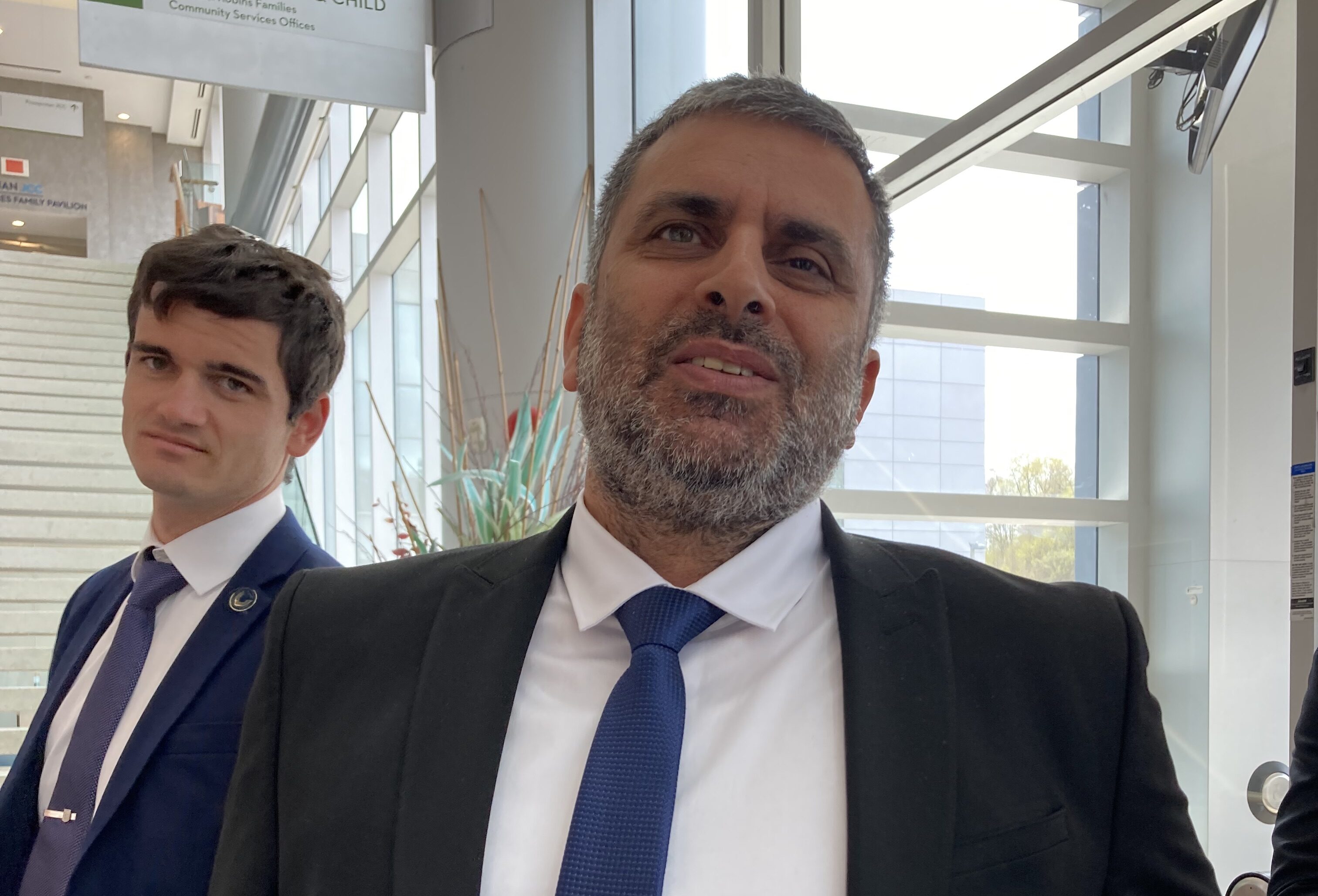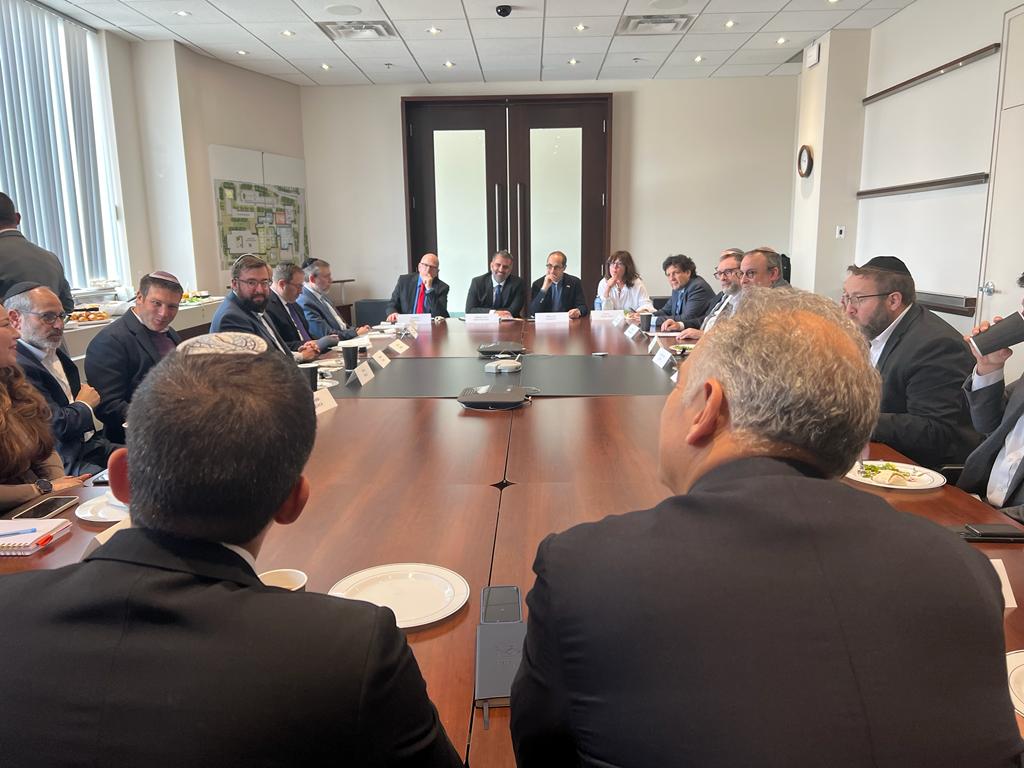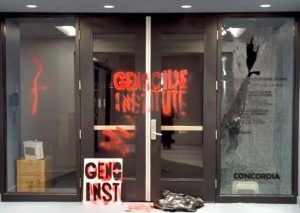Ofir Sofer spent nine hours in Toronto last week on his first visit to Canada as the newly minted Israeli minister for aliyah and absorption.
Sofer is the first member of Prime Minister Benjamin Netanyahu’s four-month-old coalition government to set foot in Canada, in the wake of massive pro-democracy street protests that have engulfed the Jewish state for weeks.
He began his North American tour April 17 at the Chabad Lubavitch world headquarters in New York. His whirlwind jaunt to Canada ended April 19, ahead of ceremonies marking Israel’s 75th birthday.
Several Canadian Jewish leaders raised their concerns with him about the situation in Israel and the political crisis, as well as over contentious proposed changes to the Law of Return that would tighten up who Israel considers Jewish enough to receive automatic citizenship.

Sofer declined to do an interview with The CJN, citing his run-ins back home with Israeli journalists who he described as “fake news.” He said he didn’t want any bad headlines to destroy “his newly built and important relationships with local Jewish communities.”
Boost immigration from Canada to Israel
But according to Rabbi Jarrod Grover of Beth Tikvah congregation, who attended a meeting with him at Yeshivat Or Chaim, the minister downplayed the effects of the current political crisis on people who are considering moving to Israel. Instead, Sofer stressed his goal is to boost levels of immigration to Israel by expanding opportunities for young Canadians to spend time in Israel.
“This is an internal crisis that will be resolved,” Sofer reportedly told Rabbi Grover and other invited guests Wednesday afternoon.
Sofer, a father of seven, is a member of Israel’s right-leaning Religious Zionist Party led by extreme right-wing settler Bezalel Smotrich, a key partner in the governing coalition.
One of Smotrich’s key conditions for entering into a coalition with the Likud party in December was to tighten up Israel’s historic Law of Return. For decades Israel has granted automatic citizenship to anyone who has at least one Jewish grandparent or who has converted to Judaism, or is married to a Jew.
But religious parties, including Sofer’s and the United Torah Party, contend that the “grandparent clause” needs to go.
They worry about increased assimilation and diluting Israel’s Jewish identity in the wake of an influx of newcomers who have tenuous ties to Judaism and little interest in living an Orthodox Jewish life. Of particular concern are the tens of thousands of new arrivals from Ukraine since the Russian invasion in 2022, as well as Russians who have come wanting to avoid persecution, or forced conscription.
Although Israel’s courts have recently ruled the country must now also accept Conservative and Reform Jewish conversions (Reform Jews recognize patrilineal descent, not just children born to a Jewish woman), in practice the country’s Orthodox-controlled rabbinate makes it difficult for non-Orthodox Jews to marry in Israel.
However, during his brief stay in Toronto, Sofer did not weigh in on where he stands on the question of changing the Law of Return.

Would ‘decimate’ Birthright and MASA: Wernick
He told Jewish leaders that he is still making up his mind, according to Rabbi Steven Wernick, who heads Beth Tzedec synagogue, Canada’s largest Conservative congregation. Rabbi Wernick was one of about 35 rabbis and lay leaders invited by UJA Federation of Greater Toronto to meet the minister at its headquarters in North York.
Rabbi Wernick told the minister that changing the Law of Return would “decimate” the popular Israeli-government supported gateway programs designed to encourage young, mostly non-Orthodox Jews to discover Israel, including the ten-day-long Birthright trips, and MASA, which runs gap-year work and study streams.
These programs accept applicants who only have Jewish fathers, even if the mother was not Jewish, he said.
“It will certainly slow down aliyah from every place because the aliyah from the West is not an aliyah of rescue, it’s an aliyah of choice,” Rabbi Wernick told The CJN in an interview in the lobby of the Lipa Green Building after the meeting ended.
“So if you’re going to change all that, then you’re going to see a drop in Birthright because why should people come to Israel, if it’s no longer their birthright, right? If I can’t make aliyah, then why should I come?” he said.
Wernick also opposes restricting automatic citizenship, citing the fact that Hitler included people with only one Jewish grandparent as targets for the Holocaust.
While Netanyahu originally proposed setting up a commission to study the Law of Return issue, he has also hinted there would be no changes made, for now.
Itinerary mainly with Orthodox Jews
Sofer’s visit to Toronto included friendly meetings with students and staff at two modern Orthodox high schools: Ulpanat Orot for Girls and Yeshivat Or Chaim. He also attended a falafel and french fries dinner with Orthodox university-aged students who are interested in immigration. That event was held at the Beth Avraham Yosef congregation in Thornhill, and was organized by the Jewish Learning Initiative on Campus, an Orthodox Union-affiliated outreach group operating at York University, Toronto Metropolitan University and the University of Toronto.
Despite his itinerary’s exposure to mainly Orthodox settings while he visited Canada, his ministry did hint he is willing to put out the welcome mat to newcomers from other streams of Canada’s Jewish community, too.
“My goal is to strengthen aliyah and assist any Jew looking to build their new home in Israel,” Sofer said in a written statement provided to The CJN.
It’s a view echoed by Rabbi Elan Mazer of Mizrachi Canada, which represents religious Zionists. Rabbi Mazer organized the Israeli politician’s tour to Toronto.
Rabbi Mazer described the minister’s Canadian visit as a tremendously moving and meaningful gesture for his community, who are already strong supporters of Israel.
“And that’s really a very special time in history to see how strong Israel is and how much they care about the Diaspora communities as a whole,” Rabbi Mazer said. “But I also think that it’s a transformative and revolutionary place that we are in in history where for so many generations, it was the Diaspora communities looking out and trying to see how they can support the State of Israel. Now this State of Israel is putting in time, effort and funding into Diaspora communities.”
Deep divide among Canadian Jews over Israel
According to Rabbi Wernick, while the discussions with Sofer were respectful and cordial, if brief, it doesn’t paper over the obvious divide between the Canadian Jewish community and the current direction the Israeli government is taking.
Rabbi Wernick left the meeting disappointed, particularly because Sofer told them his coalition government has a majority of 64 seats in the Knesset, and is serving all Israelis and all Jews around the world.
“I would say overall it feels like we’re living in two separate worlds, the way in which we understand how things are unfolding and what their impacts are, and they’re difficult to reconcile,” he said.
That was the same feeling Gail Adelson-Marcovitz was left with, after participating in the same meeting on behalf of the Centre for Israel and Jewish Affairs. The Montreal-based national chair of CIJA flew in to Toronto specially for the meeting, but didn’t get to ask any questions in the limited time allotted.
Adelson-Marcovitz was rankled by the minister’s assertion that his government has the mandate to make policy changes. Although CIJA has previously called for patience –not public protests– when it comes to expressing concerns about the current situation in Israel, Adelson recognized that they have to double down on their efforts.
“So it was an opportunity to reinforce the need to continue to press that message despite the pause that has been taken, and that we need to make sure that that message is heard, loud and clear,” she said, referring to Netanyahu’s announcement in April he would call a temporary halt to moving judicial reform legislation through the Knesset, until May 1.
Dodged protesters

A small group of Canadian protesters did try to get their pro-democracy message across through chanting and placards as they gathered Wednesday afternoon outside the Jewish Federation building. They carried Israeli flags and chanted “Shame! Shame!” in Hebrew. The protest was hastily organized by the pro-democracy Canadian chapter of an Israeli group of expatriates known as UnXeptable, who hold rallies each Sunday at Toronto’s city hall.
“I’m a little bit disappointed that the Jewish Federation doesn’t come with a more harsh message,” said organizer Yael Meiri, an Israeli who has lived in Canada for 12 years. The group was also critical of the decision by some Canadian Jewish leaders to travel to Israel and attend the General Assembly of Jewish Federations of North America, where Netanyahu was supposed to address the audience.
“They shouldn’t give a stage to the people that are trying to sabotage and do everything in order to destruct, basically, the Israeli democracy,” she said.
Netanyahu would later cancel his planned appearance.
As for the Aliyah minister, Sofer did not emerge from the Federation building to interact with the protesters. His staff ushered him out by a different exit, and he gave the group the slip as his entourage headed off to the next event.
In an email to The CJN before the minister’s visit, Steve McDonald, a spokesman for UJA’s Toronto Jewish Federation explained that Wednesday’s meeting was initiated by Sofer’s staff, not them.
“We responded that we’d welcome the opportunity, and shared that we recently convened various Jewish community leaders from across the denominational spectrum for a discussion on the current Israeli political debate – and we would very much like to invite them to join us to be a part of the conversation,” to which McDonald said the minister quickly agreed.
However, UJA Federation declined to comment after the meeting itself.
We are angry and scared: Holy Blossom rabbi
Sofer did promise to return to Toronto in the future, after his brief getting-to-know-you tour, according to Rabbi Samuel Kaye, who attended a meeting on behalf of the Reform movement’s Holy Blossom Temple. The rabbi wasn’t able to ask a question during the formal session, but he buttonholed Sofir on the way out to express his concerns.
“I told him ‘I want you to hear that we’re not only just angry, that we’re also very scared’,” Kaye said, referring to whether people who are Reform Jews or converted by a Reform rabbi would be welcome in Israel under the changes to the Law of Return.
“These changes that you’re making to who is a Jew and who is not: if there’s antisemitism in the world, we’ll turn to you in Israel and you won’t be there for us, and that’s a fear that we have.”
Since 2001, some 6,000 Canadians have immigrated to Israel under the auspices of the government-supported Nefesh B’Nefesh organization, which specifically works with Jews from Canada, the United States and the U.K.
Rabbi Grover told the minister his department needs to improve financial assistance for Jews who move to Israel, including providing tax cuts.
But he also asked for more Israeli government support for the Toronto Jewish community when it comes to strengthening their connection to Israel and their Jewish identity here on the ground, as most people in Toronto are not going to make aliyah, he said.
“Toronto is in a fight like everywhere else,” Rabbi Grover said.







